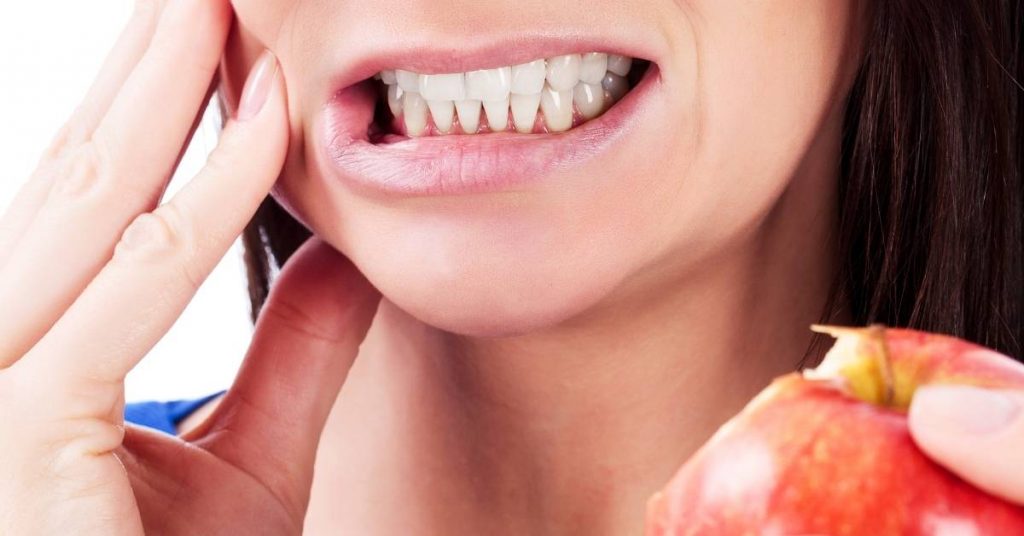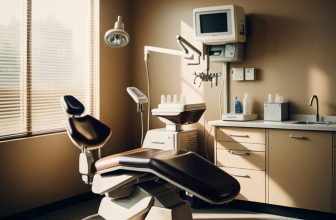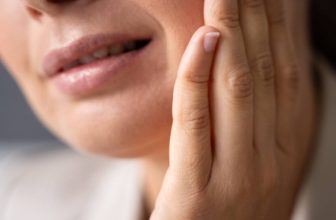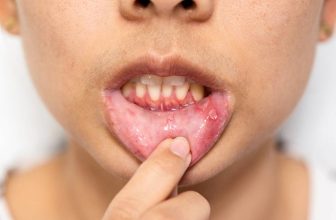If you’re experiencing tooth pain and sensitivity when chewing, it might be a sign of an oral health issue. Tooth sensitivity when chewing can often signify tooth decay or a root canal infection. Fortunately, restorative dentistry treatments are available to repair dental damage, alleviate tooth pain, and restore oral health. Contact your dentist today to find out which treatments are right for you and learn more about tooth sensitivity and chewing.
Why Are My Gums Sore?
There are a number of reasons why your gums may be sore.
1. Gum disease

One common reason is gum disease. Gum disease can occur when you do not brush your teeth regularly or floss.
Your gums may become inflamed, red, or bleed as a result. If you ignore gum disease, it may progress to the point where your gums separate from your teeth and create pockets. These pockets can fill up with food and bacteria and cause bad breath.
The bone in your gums that helps to hold your teeth in place may also deteriorate over time, leading to tooth loss. It is essential to take care of your oral health and prevent gum disease from developing by brushing your teeth at least twice a day and flossing.
2. Canker Sores
Another common reason for sore gums is canker sores. Canker sores are small, red, and painful ulcers that can form on your gums. They are usually caused by stress, acidic foods, or a weakened immune system. Canker sores typically go away on their own within a week or two. However, you can help to speed up the healing process by eating soft foods, avoiding spicy or acidic foods, and using a mouthwash.
3. Allergies
If you are allergic to certain foods or substances, you may experience swollen and sore gums. Allergies can be triggered by many different things, such as latex, nickel, or even certain toothpaste. If you think you may be allergic to something, it is essential to talk to your dentist or doctor so that they can help you identify the allergen and avoid it in the future.
4. Injury
If you injure your gums, they may become swollen and sore. If you accidentally bite your tongue or cheek or use a hard toothbrush, this can happen. You can also injure your gums by scrubbing them too hard when you brush your teeth. If you injure your gums, it is essential to clean the wound and keep it clean until it heals. You can also take over-the-counter pain medication to help relieve any discomfort.
5. Oral Thrush
Oral thrush is a fungal infection that can cause sore gums. It is most commonly seen in infants and young children but can also occur in adults. Oral thrush is caused by a type of yeast called Candida albicans. This yeast is found naturally in your mouth, but it can overgrow if your immune system is weakened or you take certain medications. You may see white patches on your tongue and gums if you have oral thrush. You may also experience soreness, redness, and burning. Oral thrush can usually be treated with antifungal medication. However, if it does not go away or keeps coming back, you should see your dentist or doctor for further treatment.
6. Dipping Tobacco
If you use dipping tobacco, you may risk developing a condition called periodontitis. Periodontitis is an inflammation of the gums that can lead to soreness, redness, and bleeding. Dipping tobacco contains nicotine and other chemicals that can damage your gums. It is crucial to quit dipping in tobacco to reduce your risk of developing periodontitis.
7. Tooth Abscess
A tooth abscess is a pocket of pus that forms around the root of a tooth. It is usually caused by bacteria that enter the tooth through a crack or cavity. A tooth abscess can cause severe pain, swelling, and redness. If you have a tooth abscess, you must see your dentist or doctor as soon as possible. They will be able to drain the pus and prescribe antibiotics to help clear the infection.
8. Pregnancy and Menopause
During pregnancy and menopause, your hormones can fluctuate. These changes can cause your gums to swell and bleed. If you are pregnant or going through menopause, taking good care of your teeth and gums is important. You should brush and floss regularly and see your dentist for regular checkups.
9. Celiac Disease
Celiac disease is an autoimmune disorder that affects the digestive system. People with celiac disease cannot eat gluten, a protein in wheat, barley, and rye. If you have celiac disease, you may experience swollen and sore gums. This is because the inflammation caused by the disease can affect the tissues in your mouth. If you have celiac disease, it is essential to follow a gluten-free diet. This will help reduce your body’s inflammation and relieve your symptoms.
10. Crohn’s Disease
Crohn’s disease is a type of inflammatory bowel disease that can cause swelling and soreness in the gums. This is because the inflammation caused by the disease can affect the tissues in your mouth. You must see your dentist or doctor for regular checkups if you have Crohn’s disease. They will be able to monitor the health of your mouth and provide treatment if necessary.
11. Oral Cancer
Oral cancer is a type of cancer that can affect the gums. It is most commonly seen in people who smoke or use other forms of tobacco. If you have oral cancer, you may see a sore on your gums that do not heal. You may also experience bleeding, pain, or numbness in your mouth. You must see your dentist or doctor for treatment if you have oral cancer. They can remove the tumor and provide further treatment if necessary.
How do I get rid of pain in my gums when chewing food

Gums can become sore and inflamed for various reasons, including poor oral hygiene, overuse of mouthwash, and sensitivity to certain foods. If you are experiencing pain in your gums when chewing, you can do a few things to help alleviate the discomfort.
1. Brush your teeth correctly
One easy way to reduce gum pain is to make sure you are brushing your teeth correctly. Be sure to use a soft-bristled toothbrush and gently brush the gums in a circular motion.
2. Use dental irrigator
You may also want to try using a dental irrigator to help remove any plaque or debris around the teeth and gums.
3. Visit your dentist
If you are having trouble identifying the cause of your gum pain, it is best to visit your dentist for a consultation. They will be able to examine your teeth and gums and determine the root cause of the issue.
In some cases, it may be necessary to undergo a dental procedure to resolve the problem:
Root canal therapy
This treatment is used to remove the infected pulp from inside the tooth.
Tooth Extraction
Sometimes, the tooth may be too damaged to save and must be removed.
Dental Crowns
If the tooth is structurally sound but has a large cavity, a dental crown can be used to cover and protect the tooth.
4. Chewing gum
Chewing gum can be a pain-free way to help reduce gum pain. Look for sugar-free options that contain xylitol, which has been shown to help reduce inflammation.
5. Suck on hard mints
Sucking on hard candy or mints can help temporarily numb the gums and relieve pain. Just brush your teeth afterward, so you don’t get cavities!
6. OTC pain medicine
Over-the-counter pain relievers like ibuprofen or aspirin can also help to reduce gum pain and inflammation. However, it is essential not to overuse these medications, as they can have side effects.
However, in most cases, simply making some lifestyle changes and practicing good oral hygiene habits will be enough to eliminate pain in your gums when chewing.







